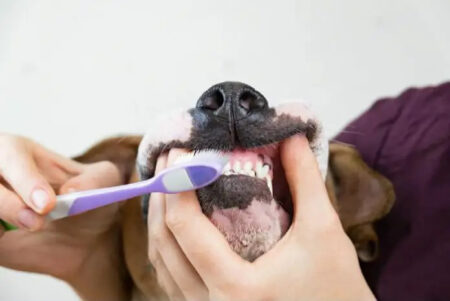If you have noticed that your dog has bad breath, you may be wondering what can be done to improve it. Just like humans, dogs can also experience foul-smelling breath, which can be caused by a variety of factors. In most cases, bad breath in dogs is a sign of dental problems, such as plaque buildup and gum disease. However, it can also be a result of more serious health issues such as diabetes, kidney disease, and digestive problems.
It is important to address your dog’s bad breath, not only for their oral hygiene but also for their overall health. This article offers information on some potential solutions that may help improve your dog’s bad breath.
What Can I Give My Dog For Bad Breath?
Brush their teeth regularly:
The best way to eliminate bad breath in dogs is by brushing their teeth regularly. Use a dog-specific toothbrush and toothpaste, and gently brush their teeth in a circular motion.
Dental chews and treats:
There are various dental chews and treats available in the market that can help keep your dog’s teeth clean and freshen their breath. Chews that are designed to promote chewing and contain ingredients like chlorhexidine, enzymes, and fluoride can be beneficial in reducing bad breath.
Fresh fruits and vegetables:
Chewing on crunchy fruits and vegetables like apples, carrots, and celery can help to physically remove plaque and freshen your dog’s breath.
Probiotics:
Probiotics help to maintain a healthy balance of good bacteria in the gut, which can improve digestion and reduce bad breath. You can give your dog probiotic supplements or add probiotic-rich foods like plain yogurt to their diet.
Coconut oil:
Coconut oil has antibacterial properties and can help eliminate bad breath-causing bacteria in your dog’s mouth. You can add a small amount of coconut oil to their food or apply it directly to their teeth.
Parsley:
Fresh parsley can act as a natural breath freshener for dogs. You can chop up some parsley and add it to their food or give them a small sprig to chew on.
Water additives:
There are water additives specifically designed to freshen your dog’s breath. These additives contain enzymes that help to break down plaque and tartar in your dog’s mouth.
SEE ALSO: My Cat Has Worms How Do I Clean My House?
What to Feed Dogs With Bad Breath?
Feeding your dog a healthy, balanced diet is key to maintaining good oral health and fresh breath. Here are some tips on what to feed dogs with bad breath:
- High-quality Dog Food: Choose high-quality dog food that is free from artificial colors, flavors, and preservatives. Look for dog food that is specifically formulated for dental health, as they may contain ingredients to help reduce plaque and tartar buildup.
- Crunchy Kibble: Kibble or dry dog food helps remove plaque and tartar from your dog’s teeth as they chew. The texture of the kibble helps scrape off food particles and bacteria from the teeth, reducing bad breath.
- Fresh Fruits and Vegetables: Adding fresh fruits and vegetables to your dog’s diet can help improve their oral health. Crunchy fruits and vegetables like apples, carrots, and celery act as natural toothbrushes, scraping off plaque and freshening your dog’s breath.
- Raw Bones: Raw bones can act as natural toothbrushes for dogs, helping to remove plaque and tartar from their teeth. However, be sure to supervise your dog while chewing on bones to prevent any choking or tooth fractures.
The Top Three Foods That Cause Bad Breath In Dogs
- Canned or Wet Food: Canned or wet dog food often contains high amounts of meat and fish, which can lead to strong odors in a dog’s mouth. These odors can contribute to bad breath, especially if the food is not properly cleaned from the teeth and gums.
- Table Scraps and Human Foods: Feeding dogs table scraps or human foods can also contribute to bad breath. Many human foods, such as garlic and onions, have strong odors that can linger in a dog’s mouth and cause bad breath. In addition, these foods may not be easily digestible for dogs, leading to stomach issues that can also contribute to bad breath.
- Bones and Rawhides: While bones and rawhides may seem like a natural and healthy treat for dogs, they can contribute to bad breath. These items can get stuck in a dog’s teeth and create spaces for bacteria to grow, leading to a foul odor.
How to Fix Fishy Dog Breath
If your dog has fishy breath, there are a few things you can do to fix the problem. First, make sure your dog is getting plenty of fresh water to drink. Dehydration can cause bad breath. Next, brush your dog’s teeth regularly with a dog-specific toothbrush and toothpaste. You may also want to consider giving your dog dental treats or toys to help keep their teeth clean. Finally, make sure to take your dog to the vet for regular checkups, including teeth cleaning if needed. By following these simple steps, you can help to keep your dog’s breath smelling fresh and clean.
What Causes Bad Breath in Dogs?
There are several possible causes of bad breath in dogs, including:
- Poor dental hygiene: Just like in humans, poor dental hygiene can lead to bad breath in dogs. If your dog’s teeth are not regularly cleaned and maintained, plaque and tartar can build up and cause a foul odor.
- Dental disease: Dental diseases, such as periodontal disease, can also contribute to bad breath in dogs. This is a result of the buildup of bacteria and plaque in the mouth, which can lead to infections and inflammation.
- Diet: The food your dog eats can also impact their breath. If your dog eats a lot of strongly scented foods, such as fish or garlic, it can cause bad breath. Additionally, a poor diet can contribute to overall poor oral health, leading to bad breath.
- Digestive issues: Bad breath can also be a symptom of digestive issues such as gastrointestinal problems or certain food intolerances. These issues can cause excess gas or foul-smelling breath.
- Respiratory infections: Infections in the respiratory tract, such as sinus infections or pneumonia, can also lead to bad breath in dogs.
- Diabetes: Dogs with diabetes may have a sweet or fruity odor on their breath due to a buildup of ketones in their body.
- Kidney disease: Dogs with kidney disease may have a distinctive ammonia-like odor on their breath due to the buildup of waste products in their blood.
- Liver disease: Liver disease can also cause bad breath in dogs. Due to a buildup of toxins in the body, a dog’s breath may have a distinct musty or sweet smell.
- Mouth or throat conditions: Oral tumors, ulcers, or infections in the mouth or throat can all contribute to bad breath in dogs.
How Do I Know If My Dog Has Bad Breath?
There are a few signs you can look for to determine if your dog has bad breath. First, pay attention to the odor. A foul odor coming from your dog’s mouth is a clear sign of bad breath. Second, watch for excessive drooling. Third, check your dog’s teeth and gums for any signs of infection or inflammation.
Natural Ways to Freshen Your Dog’s Breath
- Brush their teeth regularly: Regularly brushing your dog’s teeth is one of the most effective ways to freshen their breath. Use a toothbrush and toothpaste specifically designed for dogs and brush their teeth at least 2-3 times a week.
- Give them dental chews or toys: Dental chews and toys are designed to help clean your dog’s teeth and freshen their breath. They help to remove plaque and tartar buildup, which can lead to bad breath.
- Add fresh herbs to their food: Some herbs, such as parsley, mint, and cilantro, have natural breath-freshening properties. Add a small amount of chopped herbs to your dog’s food to help freshen their breath.
- Provide them with a high-quality diet: A healthy diet can contribute to your dog’s overall health, including their oral health. Make sure your dog is eating high-quality dog food that is free from fillers and artificial ingredients.
- Offer them raw carrots or apples: As your dog chews on these crunchy treats, they help to remove plaque and tartar from their teeth, reducing bad breath.
- Use coconut oil: Mixing a small amount of coconut oil into your dog’s food can help to reduce bacteria in their mouth and freshen their breath.
- Give them probiotics: Probiotics can help to promote good bacteria in your dog’s mouth, which can help to eliminate the bad bacteria that can contribute to bad breath.
Dog Bad Breath Remedy Yogurt
Yogurt can be a great natural remedy for bad breath in dogs. The probiotics in yogurt can help to balance the bacteria in your dog’s mouth, which can help to reduce the bad odor. Yogurt is also a good source of calcium and protein, which are essential nutrients for your dog’s health. Simply add a tablespoon of plain, unsweetened yogurt to your dog’s food once a day.
Can I Use Coconut Oil To Treat My Dog’s Bad Breath?
Coconut oil is a great natural remedy for bad breath in dogs. Coconut oil contains medium-chain triglycerides (MCTs), which have antibacterial and antifungal properties. These properties can help to kill the bacteria that cause bad breath. Additionally, the lauric acid in coconut oil can help to soothe and heal your dog’s gums, which can also contribute to bad breath. Simply add 1/4 teaspoon of coconut oil to your dog’s food once a day. You may see a noticeable improvement in your dog’s breath within a week or two.
Do Carrots Help Doggie Bad Breath?
Yes, carrots can help to improve bad breath in dogs. Carrots are a great source of fiber and vitamin A, both of which can help to reduce the amount of bacteria in your dog’s mouth and improve their overall oral health. Additionally, the crunchy texture of carrots can help to scrape away plaque and tartar from your dog’s teeth, further improving their breath. You can either give your dog raw carrots as a treat or add some shredded carrots to their food. For best results, use carrots that are free of pesticides and other chemicals.
Does Apple Cider Vinegar In My Dog’s Water Help With Bad Breath?
Apple cider vinegar (ACV) has been touted as a natural remedy for a variety of ailments, including bad breath in dogs. However, there is limited scientific evidence to support these claims. ACV is high in acetic acid, which has antibacterial and antifungal properties. This means that it may help to kill the bacteria in your dog’s mouth that cause bad breath. However, ACV can also have negative effects on your dog’s digestion and overall health if given in excess. Before giving ACV to your dog, consult with your veterinarian to make sure it is safe and appropriate for your pet.
SEE ALSO: Can Dogs Have Oat Milk?
FAQs
Q. How can I get rid of my dog’s bad breath?
A. There are several things you can do to help get rid of your dog’s bad breath. First, make sure your dog has a healthy diet. This means feeding them high-quality dog food and avoiding table scraps. It’s also important to brush your dog’s teeth regularly. Dental chews and other oral care products can also help to keep your dog’s teeth clean and free of plaque and tartar. Finally, make sure your dog has plenty of fresh water to drink.
Q. What is the best dog treat for bad breath?
A. Many dog treats on the market claim to help with bad breath. Some of the most popular options include greenies, dental bones, and breath sprays. These treats often contain ingredients like parsley, mint, and chlorophyll, which are thought to help freshen breath.
Q. Is bad breath in dogs a sign of illness?
A. Bad breath in dogs can sometimes be a sign of illness. However, it’s important to note that not all cases of bad breath are caused by an underlying health issue.
Conclusion
There are several options for treating bad breath in dogs, such as regular dental care, a healthy diet, and using specially formulated dental products. Ultimately, the best approach will depend on the cause of your dog’s bad breath and should be discussed with your veterinarian. Some herbs and home remedies may offer temporary relief, but it’s important to address the underlying issue and not just mask the symptoms. Additionally, it’s important to regularly monitor your dog’s dental health and seek professional help if needed to maintain their overall well-being.
